- Home
- Barry Unsworth
Morality Play. Mit Materialien. (Lernmaterialien) Page 5
Morality Play. Mit Materialien. (Lernmaterialien) Read online
Page 5
There was only God inside the barn, sitting on the straw, drinking ale. He seemed depressed and did not speak to me. It took little more than a minute to strip off my demon's dress and put on the Fool's tunic and shoulder-pieces and the cap and bells. But it was long enough for me to become aware again of Brendan's presence under his heap of straw in the corner. My mask now was a plain white one, full face, with a long nose-piece like the beak of a bird. I shook my bells and struck the tambourine as I went back through the people. I was a different person now, they did not hate me. They knew me for a japer, not a demon. I understood then, as I passed through the people and shook my bells and saw them smile, what all players come to know very well, how quickly shifting are our loves and hates, how they depend on mocks and disguises. With a horned mask and a wooden trident I was their fear of hell-fire. Two minutes later, still the same timorous creature as before, with a fool's cap and a white mask, I was their hope of laughter.
I was discovering also the danger of disguise for the player. A mask confers the terror of freedom, it is very easy to forget who you are. I felt it now, this slipping of the soul, and I was confused because in body I was the more restricted - the mask did not admit much light to my eyes and I could see nothing at all to the sides. Close before me, through my narrow slits, I saw the ornate and fearsome mask of Satan and I heard the strangely remote and hollowed voice of Tobias bemoaning his failure and loss.
'Ghostly paradise I was in
But thence I fell through my sin.
Earthly paradise by God's gift
Man and Woman dwell within.
I have tried all in vain
By my wiles to bring them pain ...'
I had learned Brendan's song and now I sang it and I shook the tambourine in time to the song and sang as sweetly as I was able, to soothe the Devil. I quavered at first, through fear, and this caused some laughter. But my voice strengthened as I went on and the fear fell away. When fear dies, daring is born. I finished the song, but instead of saying the lines I had learned I made the three-fingered sign to Tobias to show I would speak my own words.
'If the world belonged to thee
Lord of all things wouldst thou be Lord of life ...'
It was the Fool tempting the Devil with the World, a reversal of roles. Something new. Tobias answered with "words of his own also, having had some moments to think.
'If the world belonged to me Women all would ready be To harken to the Devil.'
Saying this, he made the two-handed gesture of copulation. By some instinct, instead of remaining still I began to circle round him, speaking now the lines I had learned, trying to remember the movements of hands and body that I had been taught. Tobias, though he had not known I would behave thus, made a comic business of it, craning round his horned mask to follow the tinkle of my bells, looking always the wrong way, always startled by the new direction of my voice. There was laughter at this and I joined in this laughter at the Devil and pointed and then tripped and fell, as I had been taught to do, but jarred my left elbow a little, and the laughter grew and it was sweet to me, I will not deny it. Turning into the light I was dazzled and for some moments I could see nothing and the laughter sounded in my ears...
CHAPTER SIX
This my first appearance as a player I felt to have been a success. But afterwards, with the others, I did not like to show elation because their mood was gloomy. Margaret had been set to watch the gate and take the money. She had taken one shilling and elevenpence and of this the innkeeper had taken threepence and three farthings. The hire of the barn was fivepence. Our triumphant entry into the town had been too much for the cart: one wheel was buckled and would need repairing. This was beyond the skill of Tobias and he thought the cost of repair would be threepence at the least. We would be left with less than a shilling to add to the common stock. And there were six of us and a horse. And we were promised for Christmas at Durham.
It was a clear night and very cold. A cladding of frost lay already on the cobblestones of the yard. It had a shine like satin where the light fell. Martin gave out twopence to each of us. Springer got out the brazier and made a fire with wood we had brought with us on the cart. Straw sat near it, huddled under a blanket. Tobias had still kept Satan's robe on and sat with the dog across his lap. Nobody mentioned Brendan. When they got the money Stephen and Margaret went off together.
There was some talk among us about the play. Straw, whose esteem of himself was always low, took the poor attendance as a failure of his, and sought to shift the blame. Hugging his knees unhappily, he gave as his opinion that God had been too long-winded and Satan too smooth. 'There was not enough movement in it,' he said. 'People cannot listen for so long.'
'They can listen if there is something to listen to,' Tobias said. He was angered by the reflection on his playing. 'You want all to be done in gesture,' he said, 'but it is words and mime together that make a play. It was not our fault tonight, it was the jongleurs that took away our custom.'
'Eve can be played without words,' Springer said. He had come to sit beside Straw and they shared the blanket. 'I have done it so,' he said.
'Eve, yes,' Martin said. 'Adam also. They are not personages, they are a man and a woman. But God and the Devil need words.' In the torchlight his face looked famished and gaunt. The high bones of his cheeks and his narrow eyes gave him the look of a wolf and this impression was strengthened by the way he leaned forward and raised his shoulders against the cold. I was struck by his loneliness and his severity - two things inseparably mixed in him. The burden of our failure lay on him; yet he was intent to correct us, to make his meaning plain. 'God and the Devil are personages,' he said. 'God is a judge, Satan is an advocate. Judging and pleading need different ways of speech. In that difference is the true play, if someone could be found to write the true words.'
'Well, certainly, there is reason in that,' said Straw, whose view of things was formed by his feelings of the moment and changed direction as rapidly as did these.
Springer's eyes were beginning to close as he felt the first heat of the fire. Weariness smoothed his thin face. 'What can words do?' he said. 'God and the Devil both know how the story ends.' He spoke slowly, like a sleepy child. 'And the people know it too,' he said.
'They know how the story ends,' Martin repeated, also speaking slowly, in what might have seemed mockery at first, but his eyes were fixed and on to his face had come a half-startled expression, as if at some recognition.
He was about to say more but I did not wait, I had been distressed to hear him speak of our Father in Heaven as a circumscribed being, the more so as I follow William of Occam, the Great Franciscan, in believing that God dwells beyond the reach of our reason, in absolute liberty and power. 'No words can bring us to the nature of God,' I said. 'Our language is human, it is we who made the rules of it. It is the sin of pride to think that our human language can lead to knowledge of the Creator. And to speak of the person of God as you have done is to break the Seventh Commandment.'
That strange quickening look had gone from his face now. He was looking at me with pity for my understanding. 'We are talking of plays, brother,' he said. 'It was the Church that first made God a player. The priests played Him before the altar and do so still, as they also play Christ and his Holy Mother and others, to help our understanding. As a player He can have his own voice, but He cannot take the voices of others. The Father of Lies has more privilege, who can borrow the tongue of the Serpent.'
'It is damnable to speak of God in such a way, as if He were no more than a voice among other voices.'
Seeing my distress, he smiled but not to deride me. His smile was lazy, coming slowly, at odds with the tenseness of his face in repose. 'In some way we have to see Him, if we put Him in a play,' he said. 'Let us see Him then as a great nobleman, owner of very vast estates. Adam and Eve are his tenants, in bondage of service. They do not pay their dues of obedience, they want to possess their holding. If He grants them all they ask there will
be nothing to punish, and then what is left of His power?'
This was worse still and I began to get to my feet, but he smiled again and raised his right hand in God's gesture of silence and said, 'You did well tonight, Nicholas, considering that it was the first time. You fell badly at the end, but urging Satan with his own words was a bold thing to conceive and you made the signs clearly and stepped neatly round him. All of us felt this.'
At these words I forgot the argument and felt my heart swell with pleasure. More to me than the praise itself was the proof that he had watched me carefully, noted what I did. Martin made himself loved, even in his profanities. And profane he did not feel himself to be, not when he talked of playing. For him the life of the play was set apart from the life outside it, with its own rules of behaviour and speech, to which all were subject, strong and weak, high and low. I did not see the danger of it then, God forgive me my folly.
Silence fell upon us now as we relaxed in the warmth from the fire. I thought of our Play of Adam and of that Garden lost by our first parents at Satan's prompting. Unlike most, I know where it lies. In the library of Lincoln Cathedral, where I had held my office of sub-deacon, there is a map which shows the place of it, at the farthest limit on the eastern side, quite cut off from the rest of the world by a great mountain. God keeps it still and walks there sometimes in the evening. Meanwhile it waits empty for the Saints to repossess it. I thought how strange it was that such a garden should stand empty and how delightful to be among that company of the Blessed, to walk amidst dwellings of jasper and crystal, through groves where every kind of tree and flower grows and birds sing with unwearied throats, where there are a thousand scents that never fade and streams flow over jewelled rocks and sands that shine brighter than silver. Cold never comes there nor wind nor rain. There is no sorrow or sickness or decay. Death himself cannot pass over that high mountain. And all this we had figured in an inn-yard with a tree cut out of board and a paper apple painted red and for a brief while people had taken it for Paradise. I have heard it said that the mountain beyond which it lies is so high that it touches the sphere of the moon, but this is difficult to believe as it would cause an eclipse ...
I was near to sleeping when Martin got up and came over to me and asked me to walk with him, speaking quietly, not including the others. I rose at once.
i cannot sit still or keep in one place after the playing,' he said, as we crossed the inn-yard. 'I am too stretched in my mind over it, not in the body so much, but the mind draws the body with it. It is not work like labouring, to make the limbs heavy and bring sleep, unless one is like poor Springer, who has fears but no nerves and is only fifteen and still growing. It is worse tonight because of the money.'
For a while we walked through the streets of the town. There were not many folk abroad now. The mud was hardening with frost. It was a black night with no stars visible - that earlier clearness of the sky was quite gone. We carried a lantern on a stick and this swinging light was all we had to see by. I could smell snow on the air and feel the massing of snow clouds in the dark, making the night thicker. We came to a small tavern, a single mean room with benches and rush mats on a floor of beaten earth. The light was poor and the smoke stung our eyes but there was a fire burning and places near it.
We drank thin ale and ate salt fish - all the place could offer. Martin was silent at first, staring into the fire. When he spoke it was again about playing and he kept his voice low so as not to be overheard - he guarded all to do with his trade very jealously. 'My father was a player,' he said. 'He died of the Plague when I was the age Springer has now. When we played in the towns, the folk came in numbers to see us. Now a few jugglers and a dancing bear can take half the people away. We are only six. For our playing in Durham before the cousin of our lady we can do
the Play of Adam and the Play of Christ's Nativity, since these we have practised. With time for preparing we can also do the Play of Noah, the Rage of Herod and the Dream of Pilate's Wife.'
He looked up sombrely and met my eye. 'We are only six,' he said again. 'What can six do? All we own goes on the back of a cart. Now there is coming more and more the big cycles of plays that are put on by the guilds. From Scotland to Cornwall it is happening, wherever people live together in numbers. In Wakefield now, or in York, they will put on twenty plays, they will go from the Fall of Lucifer to Judgement Day and they will take a week to do it. They have all the wealth of the guild to call on and they do not count the cost as it serves the fair name of their town. How can we match them?'
His eyes had widened. He spoke feelingly, but there was a look of vagueness on his face as if the words he was saying were not the true source of his feeling. 'We cannot match them,' he said. 'In Coventry I have seen Christ resurrected from the tomb with block and wheels and hoisted up to heaven, where clouds were hanging from cords not visible to the eye. I have seen a beheading of the Baptist where the player was changed for an effigy by the use of lights and trap-doors and so cleverly was it done that the people noticed nothing and they shrieked to see a headless corpse. I knew it then, when I heard them shriek at a bundle of straw dripping with oxblood. The day is over for poor players who travel with the Mysteries. We have worked and done our best and we are skilled and we sit here and drink stale beer. Between here and Durham we shall have little more than acorn meal to swallow, with our own snot for a sauce, unless Tobias can wire a rabbit, which in this frozen weather is not easy. No, brother, we must find another way. The others look to me, I am the master-player.'
He nodded heavily as he regarded me, but there was a brightness now in his look. 'Springer spoke good reason, even though he slept as he spoke,' he said. 'The story of the Fall is an old one, the people know how it ends. But supposing the story were new?'
'A new story of our parents in Paradise?'
'This murder you were talking of,' he said, 'we heard something of it on our way to see the priest.'
I am gifted with foreknowledge, as I began this account by saying. Sometimes we do not know we are waiting until the awaited thing arrives. It arrived now with these words of his, which should have come as a surprise but did not. The first dread, I felt it then, in that poor place, seeing the light on his face, light of temerity. 'The ostler at the inn spoke of it,' I said. 'I did not think you had taken notice of this talking.'
'Why, yes,' he said. 'It is our trade to take notice of such things. These were all women. They had voices long drawn-out, as women have when they agree together about a bad thing and find pleasure in so agreeing.' He opened his eyes wide and turned down the corners of his mouth and in a voice little louder than a murmur he imitated this talk of the women: 'Ye-e-es, she was always so seemly, who would have thought such a thing of her, eyes for men she had not ... Well, neighbours, what man would want her for a wife?' He stopped and looked seriously at me. 'All the voices were the same,' he said. 'Like a chorus. Why would no one want her?'
'When she had done such a thing-'
'No,' he said, 'they were speaking of the time before the murder. Perhaps she is ugly, perhaps she is a witch.'
I did not want to speak of it but his will was stronger, eclipsing mine - then and later. His desire, the light of interest on his face, compelled me. I fed this interest with the scraps he had given me himself. 'It was the Lord's confessor found the money,' I said. 'He found it in her house.'
'Not her house,' he said, 'her father's. She is a young woman, unmarried. She has no house.'
'How do you know this?' I asked him, and watched him shrug slightly. There was a strong smell of the privy out in the yard. The nightsoil gatherers had not yet passed this way. I was weary now and fearful, though I did not know of what. I had a sudden memory of the ostler's face as he turned from shadow into light.
'I spoke to the priest's woman while I was waiting,' Martin said. 'Tobias stayed outside because with him he had that cur he loves so.'
'You asked her ...?'
'Some few questions, yes.'
I w
aited for a moment but he said nothing more. Even then I could not leave the matter. 'All the same,' I said, 'it is strange, it is unusual, that a woman without help would kill a man in that fashion.'
'What fashion? We do not know how the killing was done.'
'I mean on the open road. A woman might kill a man in rage or jealousy, choosing a time when he was off his guard.'
'It was not a man, it was a boy of twelve years.'
I found no answer to this. Thomas Wells was a child then. Small puzzles removed do not make a lessening of wickedness. A woman could more easily kill a child, yes ... He had questioned the priest's woman more than a little, I saw.
He smiled now and began to speak in signs to me, something he did often, and always without warning, for the sake of giving me practice. He made the snake-sign of tonsure and belly for the monk; then the swift chopping motions of roof and walls; then the sign of urgent question, thumb and first two fingers of the left hand joined together and the hand moved rapidly back and forth below the chin - a sign very like the one that signifies eating except that in this latter case the thumb is uppermost with the elbow held out and the movements somewhat slower.
How did the Monk come to be in the house?
He waited, pressing back his head to show the need for an answer. I am sorry to say it but truth compels me, I craned forward my head to show eagerness and did my best to make the rapid tongue movements of lechery, though could not do it with the gibbering speed I had observed in Straw.
Martin laughed at this. He seemed in great good humour now. 'But she did not look at men,' he said, 'if we are to believe the good dames.' And he compressed his lips and made a gesture of the right hand against his cheek to sign blushes, then with both hands the motion of drawing close a shawl, like Chastity in the Morality Play.

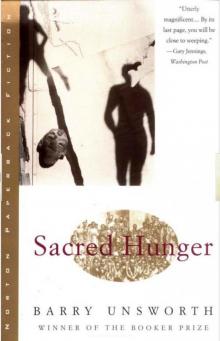 Sacred Hunger
Sacred Hunger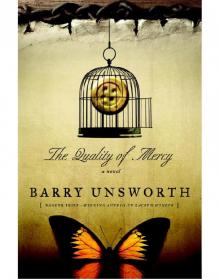 The Quality of Mercy: A Novel
The Quality of Mercy: A Novel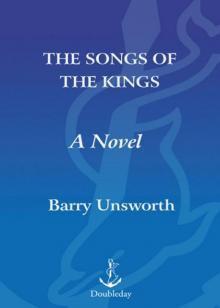 The Songs of the Kings: A Novel
The Songs of the Kings: A Novel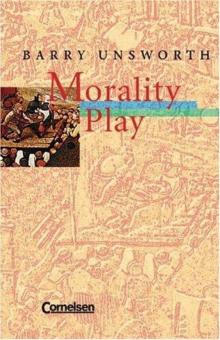 Morality Play. Mit Materialien. (Lernmaterialien)
Morality Play. Mit Materialien. (Lernmaterialien)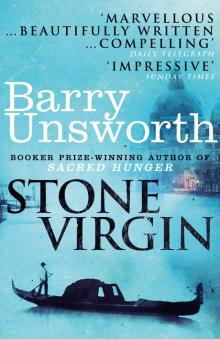 Stone Virgin
Stone Virgin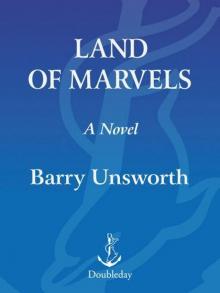 Land of Marvels
Land of Marvels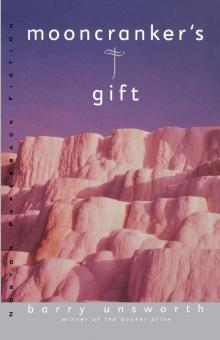 Mooncranker's Gift
Mooncranker's Gift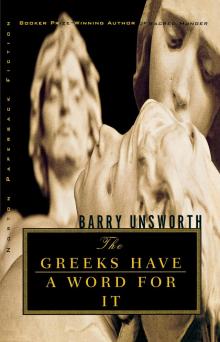 The Greeks Have a Word for It
The Greeks Have a Word for It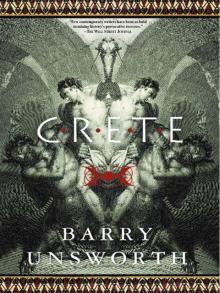 Crete
Crete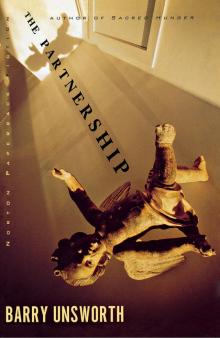 The Partnership
The Partnership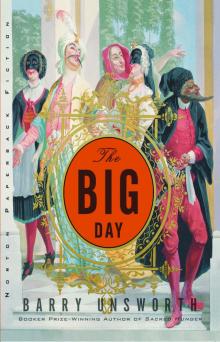 The Big Day
The Big Day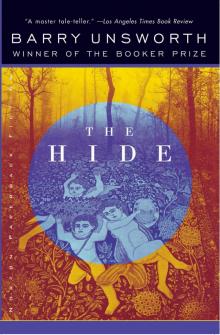 The Hide
The Hide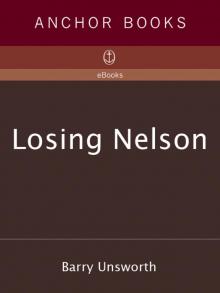 Losing Nelson
Losing Nelson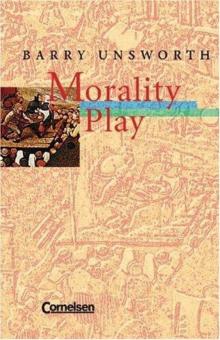 Morality Play
Morality Play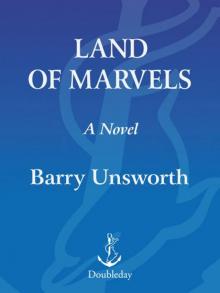 Land of Marvels: A Novel
Land of Marvels: A Novel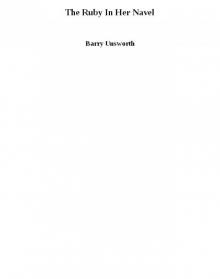 The Ruby In Her Navel
The Ruby In Her Navel